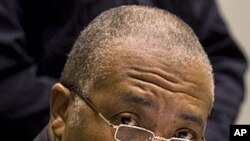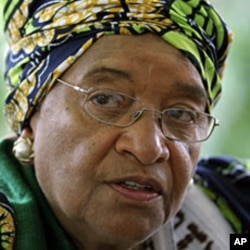The United Nations-backed Special Court for Sierra Leone at The Hague is expected to deliver its verdict Thursday against former Liberian President Charles Taylor.
He is charged with 11 counts of war crimes and crimes against humanity relating to the Sierra Leone civil war which ended in 2003.
Mr. Taylor has pleaded not guilty to all charges, dismissing them as "lies" and claiming to be the victim of a plot by "powerful countries."
In advance of the verdict, the Liberian government Wednesday issued a statement urging Liberians to remain calm and peaceful.
The statement reaffirms the government’s confidence in the international justice system and said it believes the outcome would be accepted by all Liberians “irrespective of our differences”.
Press Union of Liberia President Peter Quaqua said the atmosphere in Liberia is tense with celebrations being planned both for Mr. Taylor’s possible acquittal and guilty verdict.
“There is mixed reaction and mixed feelings in the country, and it seems that there are very many people who believe that Mr. Taylor is going to be acquitted. There is also a section of the country that believes that certainly he should be found guilty and punished for the crimes he might have committed in Sierra Leone,” he said.
Quaqua said Taylor still has many supporters in Liberia.
He said the Liberian government’s statement Wednesday urging Liberians to remain calm and peaceful is in response to the public’s expectation of the expected verdict.
“I think what is coming out of the public I’m sure is what the government is responding to. From all indications, we have a segment of the society that this gearing up for celebrations either for or against the acquittal of Mr. Taylor. And therefore I’m sure the government is watching that knowing the kind of person Mr. Taylor is or was in Liberia, probably the government is trying to exercise precaution by calling on citizens to remain calm,” he said.
Nigerian authorities arrested Taylor in March 2006 when he tried to flee from exile in Nigeria after stepping down as Liberian president three years earlier in a negotiated end to a civil war in his own country.
He was transferred to the Special Court for Sierra Leone in Freetown, but in June 2006 a UN Security Council resolution cleared the way for him to be transferred to The Hague, saying his presence in West Africa was an "impediment to stability and a threat to the peace."
Some Liberians believe it was President Ellen Johnson Sirleaf who gave her blessing for Taylor to be taken to the U.N.-backed Special Court for Sierra Leone.Quaqua said some Liberians also believe President Sirleaf was pressured by some Western powers.
“There are those who believe that Liberia especially had little option because America and the West, especially the international community had put pressure on the government to ensure that Mr. Taylor was handed over,” he said.








